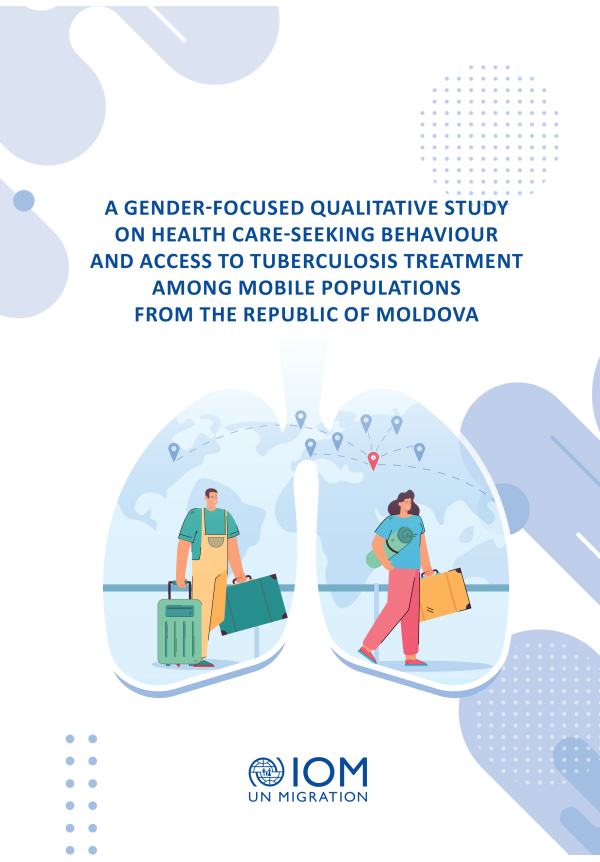A gender-focused qualitative study on health care-seeking behaviour and access to tuberculosis treatment among mobile populations from the Republic of Moldova

A gender-focused qualitative study on health care-seeking behaviour and access to tuberculosis treatment among mobile populations from the Republic of Moldova
The current study explores the differences between men and women in the knowledge, attitudes, and practices on the diagnosis, surveillance, treatment, and prevention of tuberculosis among the mobile population in the Republic of Moldova. The study is based on the analysis of qualitative data from ten focus group discussions (FGDs) out of which seven with TB patients with external migration experience three with medical specialists, two with phthisio-pneumologists and one with family doctors. There have been also, 66 interviews conducted, among them 16 with phthisio-pneumologists and 50 interviews with the TB patients (with external migration experience). Fieldwork was conducted between September and November 2021. The proposed study is in line with the Sustainable Development Goals (SDGs) agenda and Moldovan National TB Program for 2021-2025. Research to date suggests that a targeted approach is needed, specifying different risk groups for tuberculosis. Awareness rising actions that include screening and early referral to the doctor are extremely important for disease prevention. For TB patients undergoing treatment psychosocial and socioeconomic support is essential for adherence, given the complex and lengthy treatment process. The results of the study could serve as a basis for the formulation of pertinent recommendations to the relevant state and civil society actors to develop and implement effective, migrant-oriented and gender-sensitive and appropriate responsive TB policies to effectively identify, intervene, and provide adequate health services to TB patients.
Read More
- ACKNOWLEDGEMENTS
- LIST OF ACRONYMS
- DEFINITIONS AND CONCEPTS
- CHAPTER 1. INTRODUCTION AND BACKGROUN
- CHAPTER 2. METHODOLOGY
- RESEARCH FINDINGS
- CHAPTER 3. MIGRATION EXPERIENCE OF THE TUBERCULOSIS PATIENTS
- 3.1. Interviewed Tuberculosis patients’ profile
- 3.2. Working and living conditions in the host country
- CHAPTER 4. KNOWLEDGE AND PERCEPTIONS ABOUT TUBERCULOSIS
- CHAPTER 5. TUBERCULOSIS SYMPTOMS
- CHAPTER 6. ACCESS TO MEDICAL SERVICES
- 6.1 In the host country
- 6.2 In the Republic of Moldova
- CHAPTER 7. TUBERCULOSIS DIAGNOSIS
- 7.1 Establishing the Tuberculosis diagnosis
- 7.2 COVID-19 and the Tuberculosis diagnosis
- 7.3 Psychosocial implications of the Tuberculosis diagnosis
- CHAPTER 8. TUBERCULOSIS TREATMENT
- 8.1 Inpatient treatment
- 8.2 Outpatient treatment
- 8.3 Tuberculosis Treatment abroad
- 8.4 Conditions and risk factors for treatment discontinuation
- 8.5 Prevention of abandonment
- CHAPTER 9. APPRECIATION OF SERVICES
- 9.1 Medical services
- 9.2 Psychological services and social benefits
- 9.3 Support for treatment adherence
- CHAPTER 10. COSTS OF THE TUBERCULOSIS DIAGNOSIS AND TREATMENT
- 10.1 Diagnostic expenses
- 10.2 Treatment costs
- 10.3 Coping/overcoming strategies
- CHAPTER 11. STIGMA AND DISCRIMINATION
- CHAPTER 12. RESPONDENTS’ RECOMMENDATIONS
- CONCLUSIONS
- ANNEXES
- Annex 1. Research participants
- Annex 2. Guidelines
- Annex 3. Percentage of Tuberculosis patients with history of migration, Republic of Moldova, 2015–2020
- Annex 4. Number of new active Tuberculosis cases by sex, Republic of Moldova, 2014–2020
- Annex 5. Percentage of new Tuberculosis cases by age group, Republic of Moldova, 2020
- Annex 6. Case studies
- BIBLIOGRAPHY